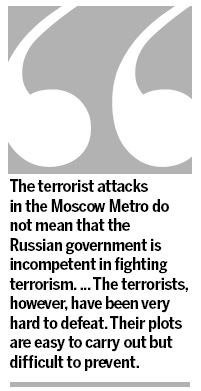Russia's uphill climb against terror
Updated: 2010-04-02 06:34
By Xing Guangcheng (China Daily)
Eitor's note: This week's terrorist attacks in Russia have indicated that the terrorism is still threatening Russia. Russian government will take rigorous and comprehensive measures to deter terrorist attacks and keep the public calm.
After Monday's brutal suicide bombings in the subway stations of Moscow shocked Russia and the world, the nation was rocked by two more suicide bombings in Kizlyar, Dagestan, on Wednesday. At least 12 were killed and 23 wounded in the Wednesday attacks; the victims were mostly members of Russia's security forces.Two more people were killed and a third was injured in an explosion overnight Thursday in Caucasus region of Dagestan.
Though Russia has stepped up its battle against the North Caucasus terrorist group in recent years - this year, national security authorities intensified anti-terror operations in the northern region - this week's blasts indicate that Russia has not achieved a decisive victory against terrorists.
| ||||
The Monday attacks were not the first assaults on the Moscow Metro transit for the terrorists. In August 2003, a woman suicide bomber exploded a train in the subway tunnel. Six months later, a similar bombing created chaos at a Metro station. But the bombings this time differ from the previous attacks in three ways: First, the terrorists carefully selected the locations of the bombings. The stations hit by the bombers, Lubyanka and Park Kultury, are both interchange stations with heavy traffic and any attack would bring heavy casualties.
Second, the bombings were set off in the morning rush hours to maximize the effect.
Third, the bombings occurred one after another, which were apparently deliberate plots by the terrorists aiming to instill terror and panic in the public.
Clearly, the terrorists will use any extreme measure, such as using women to be suicide bombers, to make their point and achieve their goals.
So how did this all happen? First, the terrorists usually take advantage of asymmetric means, no matter how cruel. Second, most of the women suicide bombers have lost their husbands, fathers or relatives in the Chechen wars and are consequently retaliating against the Russian government. Third, since many areas in the North Caucasus are mired in poverty, some women have become terrorists in order to make a living. Fourth, the terrorist groups intimidated and lured some women into becoming suicide bombers. Fifth, women suicide bombers are less visible in their attacks. Though there are various reasons that touch off the phenomenon, one thing is certain: The anti-terror struggles in Russia must deal with very complicated social backgrounds.
The terrorist attacks in the Moscow Metro do not mean that the Russian government is incompetent in fighting terrorism. Last year alone, the Russian Internal Troops destroyed 120 military bases of the illegal armed forces and killed 230 insurgents in the North Caucasus. The terrorists, however, have been very hard to defeat. Their plots are easy to carry out but difficult to prevent.
Though the Moscow authority has taken measures to prevent future terrorist attacks on the Metro, the subway is still vulnerable. The attacks show that security at the entrances of the Metro stations is insufficient, leaving security loopholes that can be exploited by terrorists. After the bombings in 2003 and 2004, strict Metro security control was adopted but it hasn't been maintained. First, intensive security would cause a lot of inconvenience for passengers. Second, intense security control is highly costly.
Third, a large police force has to be deployed to the subway. The terrorist groups can patiently wait for opportunities to conduct attacks. Hence, it's uncertain if the costly anti-terror measures would work.
After the attacks, the Russian government may execute large-scale military actions in the North Caucasus to assault and suppress the terrorist forces. In the core areas including Moscow, it will take rigorous and comprehensive measures to deter terrorist attacks and keep the public calm.
President Dmitry Medvedev and Prime Minister Putin have repeatedly emphasized the fight against terrorism. And the Russian government has started to deal with the sources of terrorism through political, economic, cultural and military measures in order to curb the expansion of terrorism.
The Moscow Metro bombings occurred despite fierce anti-terror situations around the globe in Afghanistan and Pakistan. Almost all countries have denounced the attacks in Moscow.
But Western countries hold a double standard on Russia's stance against terrorism. On the one hand, they have decried the terrorist attacks. On the other hand, they have condemned Russia's anti-terror operations in Chechnya. The ambiguous attitude may complicate international efforts to fight terrorism and impede their effectiveness. Though the attacks in Dagestan might have been carried out by another terrorist group, it is a strong possibility that a new wave of terrorist attacks from the North Caucasus has broken out. It is hard to tell whether more attacks will follow, but we cannot rule out the possibility. Whether the renewed anti-terrorist campaign succeeds depends on whether Russian authorities take proper and immediate actions.
The fight against terrorism in Russia is destined to be a long and hard battle.
The author is a researcher with Center of China's Borderland History and Geography Research, Chinese Academy of Social Sciences

(China Daily 04/02/2010 page9)
Paper's Digest

Convertible yuan
The yuan is likely to be fully convertible and on the way to being one of the world's major currencies by 2020.
Fight against inflation
Words of passion
Euro vision
Specials

Internet aids luxury sales
More sophisticated Chinese consumers are surfing for luxury products on the Internet and a number of branded labels are ready to ride the wave.

Tobacco controls
An anti-smoking watchdog has criticized Chinese authorities for "making little progress" on enforcing tobacco controls.

Godfather of yachts
Traugott Kaminski claims he was the first person to bring the yacht culture to China seven years ago.




